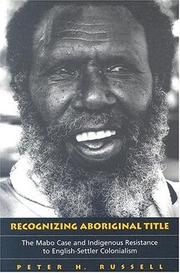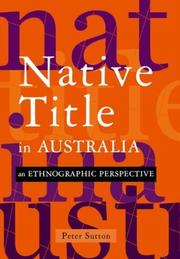| Listing 1 - 10 of 14 | << page >> |
Sort by
|
Periodical
Publisher: Canberra : AIATSIS Native Title Research Unit
Abstract | Keywords | Export | Availability | Bookmark
 Loading...
Loading...Choose an application
- Reference Manager
- EndNote
- RefWorks (Direct export to RefWorks)
Native title (Australia) --- Land tenure --- Aboriginal Australians --- Torres Strait Islanders --- Law and legislation --- Civil rights --- Australia.

ISBN: 9781442657199 1442657197 0802094430 9780802094438 0802038638 9780802038630 9781442659254 1442659254 Year: 2005 Publisher: Toronto
Abstract | Keywords | Export | Availability | Bookmark
 Loading...
Loading...Choose an application
- Reference Manager
- EndNote
- RefWorks (Direct export to RefWorks)
Annotation
Torres Strait Islanders --- Native title (Australia) --- Land tenure. --- Civil rights. --- Legal status, laws, etc. --- Mabo, Eddie --- Aborigines. --- Torres Strait Islands
Book
ISBN: 1760461881 1760461873 Year: 2018 Publisher: ANU Press
Abstract | Keywords | Export | Availability | Bookmark
 Loading...
Loading...Choose an application
- Reference Manager
- EndNote
- RefWorks (Direct export to RefWorks)
The Australian Federal Native Title Act 1993 marked a revolution in the recognition of the rights of Australia’s Indigenous peoples. The legislation established a means whereby Indigenous Australians could make application to the Federal Court for the recognition of their rights to traditional country. The fiction that Australia was terra nullius (or ‘void country’), which had prevailed since European settlement, was overturned. The ensuing legal cases, mediated resolutions and agreements made within the terms of the Native Title Act quickly proved the importance of having sound, scholarly and well-researched anthropology conducted with claimants so that the fundamentals of the claims made could be properly established. In turn, this meant that those opposing the claims would also benefit from anthropological expertise.
Native title (Australia) --- Law and legislation. --- Australia. --- Aboriginal title (Australia) --- Australian aboriginal title --- Aboriginal Australians --- Land titles --- Torres Strait Islanders --- Land tenure --- Anthropology. --- Human beings --- Aboriginals, Australian --- Aborigines, Australian --- Australian aboriginal people --- Australian aboriginals --- Australian aborigines --- Australians, Aboriginal --- Australians, Native (Aboriginal Australians) --- Native Australians (Aboriginal Australians) --- Ethnology --- Indigenous peoples --- australia --- indigenous people --- native title --- land rights --- anthropology --- Aboriginal title --- Ethnography --- Genealogy --- Norman Tindale --- Oral tradition --- Native title - Law and legislation. --- Social identity - Aboriginality. --- Aboriginal Australians.
Book
ISBN: 1921313528 192131351X 9781921313523 Year: 2007 Publisher: Canberra, Australian Capital Territory : Australian National University E Press,
Abstract | Keywords | Export | Availability | Bookmark
 Loading...
Loading...Choose an application
- Reference Manager
- EndNote
- RefWorks (Direct export to RefWorks)
Law - Non-U.S. --- Law, Politics & Government --- Law - Africa, Asia, Pacific & Antarctica --- Native title (Australia) --- Social aspects. --- Aboriginal title (Australia) --- Australian aboriginal title --- Aboriginal Australians --- Land titles --- Torres Strait Islanders --- Land tenure --- Ethnology --- Cultural anthropology --- Ethnography --- Races of man --- Social anthropology --- Anthropology --- Human beings --- Native title.
Book
ISBN: 0191710431 9780191710438 Year: 2004 Publisher: Oxford : Oxford University Press,
Abstract | Keywords | Export | Availability | Bookmark
 Loading...
Loading...Choose an application
- Reference Manager
- EndNote
- RefWorks (Direct export to RefWorks)
This text describes the encounter between the common law legal system and the tribal peoples of North America and Australasia. It is a history of the role of anglophone law in managing relations between the British settlers and indigenous peoples from colonial foundation to the end of the 20th century.
Indigenous peoples --- Aboriginal Australians --- Indians of North America --- Human Rights --- Law, Politics & Government --- Legal status, laws, etc --- Legal status, laws, etc. --- Ethnology --- Government policy - Self determination. --- Race relations - Reconciliation. --- Native title - Common law - Case law. --- Politics and Government - Sovereignty. --- Native title - Common law / Case law.

ISBN: 1107144418 1280437618 0511184360 0511166192 0511164262 0511312962 0511481632 0511165064 9780511184369 9780511166198 9780511165061 0511162669 9780511162664 9780511481635 9780521812580 0521812585 9786610437610 6610437610 0521812585 9781280437618 9780521011907 0521011906 Year: 2004 Publisher: New York : Cambridge University Press,
Abstract | Keywords | Export | Availability | Bookmark
 Loading...
Loading...Choose an application
- Reference Manager
- EndNote
- RefWorks (Direct export to RefWorks)
Native title has often been one of the most controversial political, legal and indeed moral issues in Australia. Ever since the High Court's Mabo decision of 1992, the attempt to understand and adapt native title to different contexts and claims has been an ongoing concern for that broad range of people involved with claims. In this book, originally published in 2003, Peter Sutton sets out fundamental anthropological issues to do with customary rights, kinship, identity, spirituality and so on that are relevant for lawyers and others working on title claims. Sutton offers a critical discussion of anthropological findings in the field of Aboriginal traditional interests in land and waters, focusing on the kinds of customary rights that are 'held' in Aboriginal 'countries', the types of groups whose members have been found to enjoy those rights, and how such groups have fared over the last 200 years of Australian history.
Aboriginal Australians --- Land tenure --- Native title (Australia) --- Customary law --- Aboriginal title (Australia) --- Australian aboriginal title --- Land titles --- Torres Strait Islanders --- Land tenure. --- Civil rights. --- Legal status, laws, etc. --- Law and legislation --- Australia --- Race relations. --- Social policy. --- Politics and government. --- Social Sciences --- Anthropology --- Native title. --- Government policy. --- Politics and Government - Civil rights and citizenship. --- Law - Indigenous.
Book
ISBN: 1139109030 1108039820 Year: 2011 Publisher: Cambridge : Cambridge University Press,
Abstract | Keywords | Export | Availability | Bookmark
 Loading...
Loading...Choose an application
- Reference Manager
- EndNote
- RefWorks (Direct export to RefWorks)
The first attempt by Europeans to settle in the area that eventually became the state of Victoria, Australia, was led by Colonel David Collins in 1803. Melbourne was founded in 1835, and after the discovery of gold in 1851 became the financial centre of Australia. This authoritative two-volume history of the state's first century, published in 1904 by the banker Henry Gyles Turner (1831-1920), is based on parliamentary records and information from leading political figures with whom the author was personally acquainted. Volume 1 traces Victoria's development from its early settlement to its establishment as an independent colony and the discovery of gold. It explores the region's progress and the challenges it faced as the gold rush led to overpopulation, high living costs, and mining disputes. The book gives first-hand insights into a time of rapid political, social and economic change.
Colonization. --- Collins, David, --- Travel --- Land, rights, laws. --- Law, justice, and development. --- Victoria --- Australia --- History. --- Economic conditions. --- Discovery and exploration. --- Colonisation --- Imperialism --- Land settlement --- Colonies --- Decolonization --- Emigration and immigration --- Law, justice, and development series --- Issues papers (Australian Institute of Aboriginal and Torres Strait Islander Studies. Native Title Research Unit) --- Issues paper (Australian Institute of Aboriginal and Torres Strait Islander Studies. Native Title Research Unit)
Book
ISBN: 1921862432 1921862424 9781921862434 9781921862427 Year: 2011 Publisher: Acton, A.C.T. : ANU E Press,
Abstract | Keywords | Export | Availability | Bookmark
 Loading...
Loading...Choose an application
- Reference Manager
- EndNote
- RefWorks (Direct export to RefWorks)
Anthropologists have been appearing as key expert witnesses in native title claims for over 20 years. Until now, however, there has been no theoretically-informed, detailed investigation of how the expert testimony of anthropologists is formed and how it is received by judges. This book examines the structure and habitus of both the field of anthropology and the juridical field and how they have interacted in four cases, including the original hearing in the Mabo case. The analysis of background material has been supplemented by interviews with the key protagonists in each case. This allows the reader a unique, insider's perspective of the courtroom drama that unfolds in each case. The book asks, given the available ethnographic research, how will the anthropologist reconstruct it in a way that is relevant to the legal doctrine of native title when that doctrine gives a wide leeway for interpretation on the critical questions.
Evidence, Expert --- Forensic anthropology --- Aboriginal Australians --- Native title (Australia) --- Law - Non-U.S. --- Law, Politics & Government --- Law - Africa, Asia, Pacific & Antarctica --- Legal status, laws, etc --- Legal status, laws, etc. --- Aboriginal title (Australia) --- Australian aboriginal title --- Anthropology, Forensic --- Medicolegal anthropology --- Expert evidence --- Expert testimony --- Expert witness --- Expert witnesses --- Opinion evidence --- Scientific evidence (Law) --- Land titles --- Torres Strait Islanders --- Forensic sciences --- Physical anthropology --- Evidence (Law) --- Witnesses --- Land tenure --- Anthropology --- Native title - Expert evidence. --- Anthropology - Theory and criticism.
Book
ISBN: 1921536349 1921536357 9781921536359 9781921536342 9781921536342 Year: 2008 Publisher: Canberra ANU Press
Abstract | Keywords | Export | Availability | Bookmark
 Loading...
Loading...Choose an application
- Reference Manager
- EndNote
- RefWorks (Direct export to RefWorks)
In this absorbing collection of papers Aboriginal, Maori, Dalit and western scholars discuss and analyse the difficulties they have faced in writing Indigenous biographies and autobiographies. The issues range from balancing the demands of western and non-western scholarship, through writing about a family that refuses to acknowledge its identity, to considering a community demand not to write anything at all. The collection also presents some state-of-the-art issues in teaching Indigenous Studies based on auto/biography in Austria, Spain and Italy.
Gender & Ethnic Studies --- Social Sciences --- Ethnic & Race Studies --- Aboriginal Australians --- aboriginal australians --- history --- biography --- Autobiography --- Dalit --- Indigenous Australians --- Nelson Mandela --- Government policy - Assimilation. --- Cultural protocols. --- Native title - Claims. --- Child welfare - Child / parent separation. --- Race relations - Representation - Literature. --- Race relations - Representation - Media. --- Race relations - Racial discrimination - Legislative. --- Native title - Determinations. --- Government policy - State and territory - Queensland. --- Social identity. --- History - Biographies - Indigenous - Autobiographies. --- Politics and Government - Civil rights and citizenship. --- Child welfare - Child / parent separation - Stolen generations. --- Law - Administrative law - Queensland. --- History - Biographies - Indigenous.
Book
ISBN: 192214472X 1922144738 9781922144737 Year: 2013 Publisher: Canberra : Australian National University, E Press,
Abstract | Keywords | Export | Availability | Bookmark
 Loading...
Loading...Choose an application
- Reference Manager
- EndNote
- RefWorks (Direct export to RefWorks)
Within the context of three mining agreements in north Australia this study considers Indigenous livelihood aspirations and their intersection with sustainable development agendas.
Law - Africa, Asia, Pacific & Antarctica --- Law - Non-U.S. --- Law, Politics & Government --- Aboriginal Australians --- Mines and mining --- Social conditions. --- Aboriginals, Australian --- Aborigines, Australian --- Australian aboriginal people --- Australian aboriginals --- Australian aborigines --- Australians, Aboriginal --- Australians, Native (Aboriginal Australians) --- Native Australians (Aboriginal Australians) --- Ethnology --- Indigenous peoples --- Native title - Mining industry.
| Listing 1 - 10 of 14 | << page >> |
Sort by
|

 Search
Search Feedback
Feedback About UniCat
About UniCat  Help
Help News
News